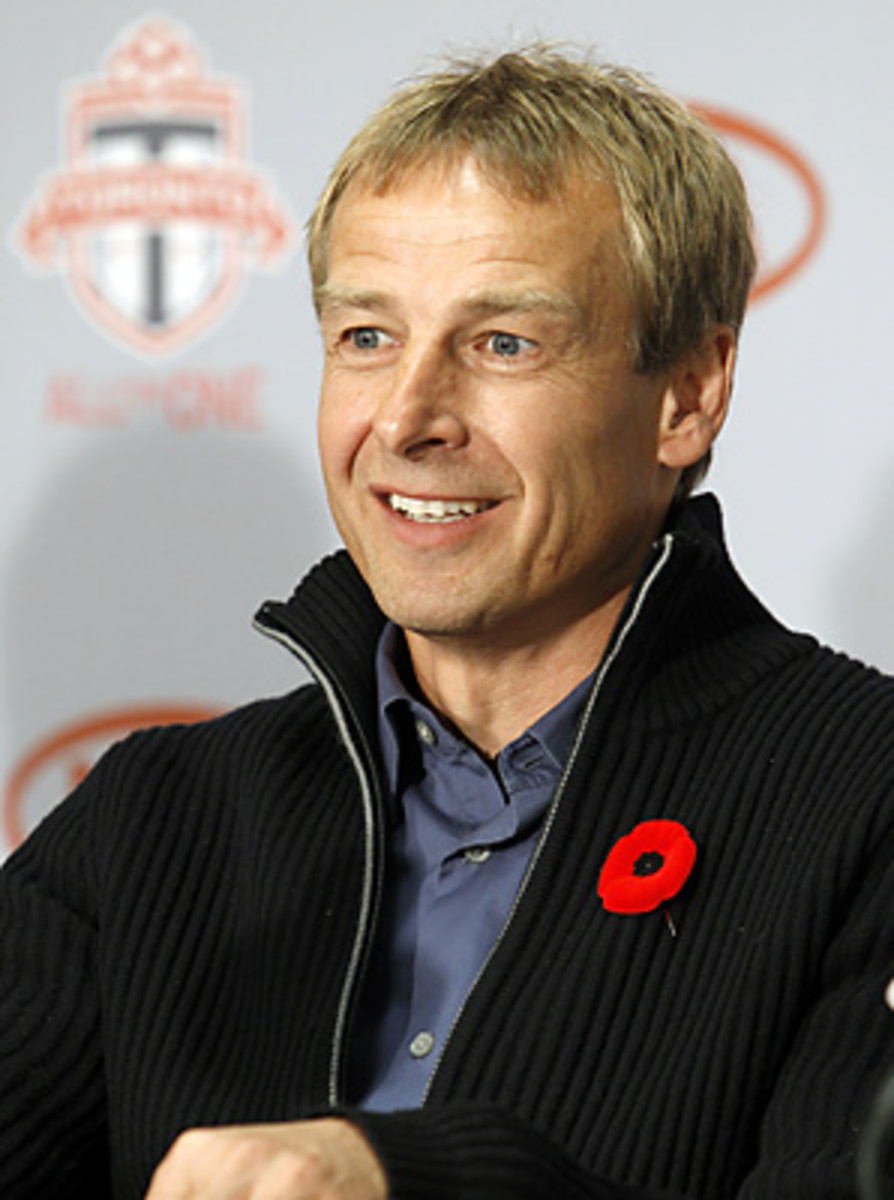
Klinsmann could redefine U.S. team's philosophy at all levels
Klinsmann, the German playing legend and coach of Germany's 2006 World Cup semifinalists, was named the new coach of the U.S. men's national team on Friday, replacing Bob Bradley. And while Klinsmann can only select the U.S. players at his disposal, one thing is certain: We have entered a new era of U.S. Soccer, one that will be defined by Klinsi's undeniable charisma and his desire to shape the team into a recognizable American style.
"The U.S. is known worldwide as a melting pot," Klinsmann told me last year. "Soccer in a certain way transmits the culture of a country ... You have the Latin influence [in the U.S.]. You have the cultural backbone of your university system, which is completely different from the rest of the world. You have the fact that it's mostly organized soccer, when we know that the best players in the world come out of unorganized events. I think it's a fascinating topic."
Success is hardly guaranteed here, but that's what will be so fascinating about Klinsmann's tenure: Major changes are in store for a U.S. team that has gone through minor, incremental changes for as long as anyone can remember. That malaise that U.S. Soccer has been in since World Cup '10? You can kiss that goodbye.
What kind of a style will we see the U.S. adopt under Klinsmann? "My philosophy is an attacking style of football," he told me last year. "That's just the way I think, and it's how I built the German team for the 2006 World Cup over two years, which was highly criticized over a long stretch of time, and then they embraced it. It's a style of play that takes time to implement, and you need the environment that gives you that time."
DAVIS: U.S. players that could be helped or hurt by Klinsmann's hiring
Besides his experience at the highest levels, Klinsmann's greatest attribute is his optimism, and yet there's a big difference between giving good sound bites that fans want to hear and achieving real results on the field. Klinsmann talks a great game and will draw attention to U.S. Soccer in ways the stoic Bradley never could, but will Klinsi and his staff (which has yet to be named) be able to back up that talk and revolutionize the U.S. team? Will he be able to fit these U.S. players into the attacking style he wants?
"This is a difficult discussion," he said last year. "What players do you have available? Where do those players come from? What is the style of play that they fit into? You can't just say I love to play attacking football and a Brazilian type of football if you don't have the players to do that."
"At the end of the day you need to have success to move this sport forward. I think the U.S. is a nation that wants to always be No. 1 in the world. It's the leader in so many areas, and in a certain way you're almost forced to be proactive in your approach to how you do things. They're not waiting always until the other countries do something. They just do it."
The timing of Klinsmann's hiring gives him the chance to reshape not just the senior team, which doesn't have any meaningful games until World Cup qualifying starts next June, but also the U.S. youth system. The U.S. has vacancies right now in the U-23 (Olympic) team and the U-20 team, and you can be certain that Klinsmann will be on the same wavelength with Claudio Reyna, the U.S. youth technical director who just devised a new coaching curriculum for youth coaches around the country.
Control has always been at the heart of Klinsmann's previous refusals to take the U.S. job, so you can be certain that he will have more control than any of his predecessors. Much will depend on the coaches he names to his staff. As the Germany coach in '06, Klinsmann delegated most of the tactical duties to Joachim Löw, who was thought by many to be the brains of the operation. Löw replaced Klinsmann at the helm and led Germany to the semifinals in last year's World Cup as well.
Let's be honest: Handing Klinsmann the keys to U.S. Soccer is an exhilarating moment for many fans and probably several players, but it's also a big risk. Klinsmann's reputation in Germany these days is not good at all after he spent less than a season at Bayern Munich in 2008-09 before being fired by the club's powerful board. Several players said Klinsmann lost the locker room, and I'm told that he would have a hard time getting a job in Germany again.
When I asked Bayern president Uli Hoeness last year about Klinsmann, this is what he said: "I still think that Jürgen could be a good coach for a national team. I'm not so sure anymore if he's a good coach for a [club] football team. Jürgen is a free spirit who needs his time out, you know ... In the national team you have your day off, your weeks off, your weekend, and that is for his character very important. With us I had the impression that was not the right thing for him. I could easily imagine if he's taking [a national-team job] as he was with Germany, it was a super time. I still believe that could work."
Now, after five years of pursuing Klinsmann, U.S. Soccer finally has its man. Will it work? Who knows? For now it's enough to know that the possibility of smashing success or spectacular failure has provided a stale U.S. team with a jolt of electricity.




